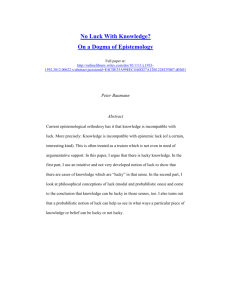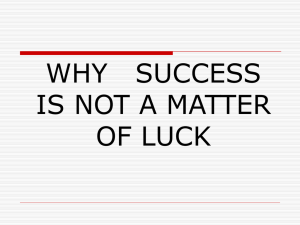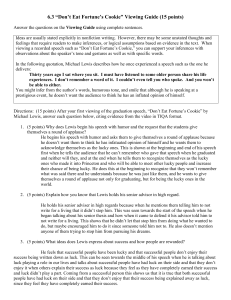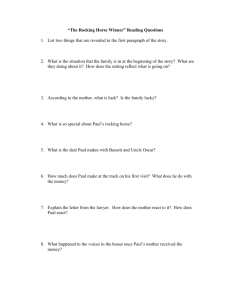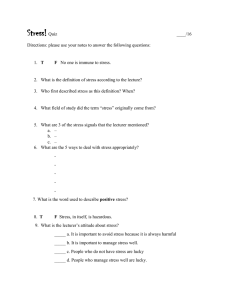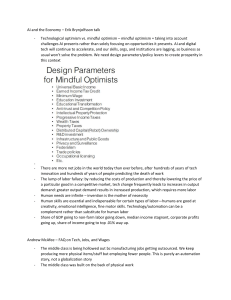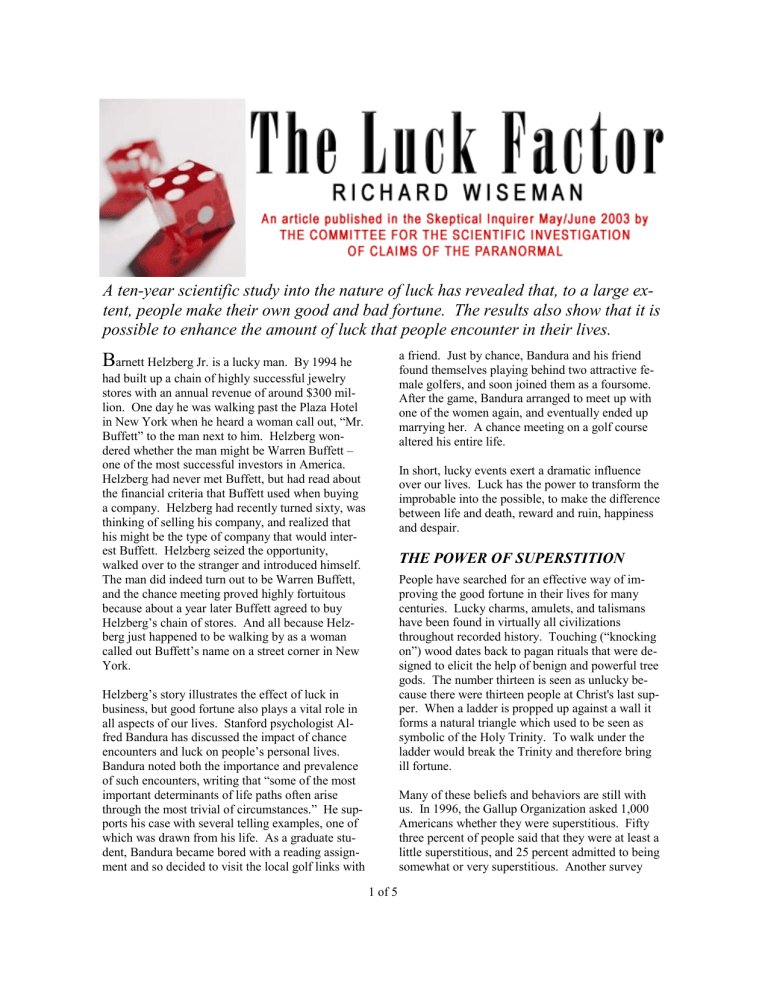
A ten-year scientific study into the nature of luck has revealed that, to a large extent, people make their own good and bad fortune. The results also show that it is possible to enhance the amount of luck that people encounter in their lives. a friend. Just by chance, Bandura and his friend found themselves playing behind two attractive female golfers, and soon joined them as a foursome. After the game, Bandura arranged to meet up with one of the women again, and eventually ended up marrying her. A chance meeting on a golf course altered his entire life. Barnett Helzberg Jr. is a lucky man. By 1994 he had built up a chain of highly successful jewelry stores with an annual revenue of around $300 million. One day he was walking past the Plaza Hotel in New York when he heard a woman call out, “Mr. Buffett” to the man next to him. Helzberg wondered whether the man might be Warren Buffett – one of the most successful investors in America. Helzberg had never met Buffett, but had read about the financial criteria that Buffett used when buying a company. Helzberg had recently turned sixty, was thinking of selling his company, and realized that his might be the type of company that would interest Buffett. Helzberg seized the opportunity, walked over to the stranger and introduced himself. The man did indeed turn out to be Warren Buffett, and the chance meeting proved highly fortuitous because about a year later Buffett agreed to buy Helzberg’s chain of stores. And all because Helzberg just happened to be walking by as a woman called out Buffett’s name on a street corner in New York. In short, lucky events exert a dramatic influence over our lives. Luck has the power to transform the improbable into the possible, to make the difference between life and death, reward and ruin, happiness and despair. THE POWER OF SUPERSTITION People have searched for an effective way of improving the good fortune in their lives for many centuries. Lucky charms, amulets, and talismans have been found in virtually all civilizations throughout recorded history. Touching (“knocking on”) wood dates back to pagan rituals that were designed to elicit the help of benign and powerful tree gods. The number thirteen is seen as unlucky because there were thirteen people at Christ's last supper. When a ladder is propped up against a wall it forms a natural triangle which used to be seen as symbolic of the Holy Trinity. To walk under the ladder would break the Trinity and therefore bring ill fortune. Helzberg’s story illustrates the effect of luck in business, but good fortune also plays a vital role in all aspects of our lives. Stanford psychologist Alfred Bandura has discussed the impact of chance encounters and luck on people’s personal lives. Bandura noted both the importance and prevalence of such encounters, writing that “some of the most important determinants of life paths often arise through the most trivial of circumstances.” He supports his case with several telling examples, one of which was drawn from his life. As a graduate student, Bandura became bored with a reading assignment and so decided to visit the local golf links with Many of these beliefs and behaviors are still with us. In 1996, the Gallup Organization asked 1,000 Americans whether they were superstitious. Fifty three percent of people said that they were at least a little superstitious, and 25 percent admitted to being somewhat or very superstitious. Another survey 1 of 5 revealed that 72 percent of the public said that they possessed at least one good luck charm. Superstitious beliefs and behaviors have been passed down from generation to generation. Our parents told us about them and we will pass them on to our children. But why do they persist? I believe that the answer lies in the power of luck. Throughout history, people have recognized that good and bad luck can transform lives. A few seconds of ill fortune can lay waste years of striving, and moments of good luck can save an enormous amount of hard work. Superstition represents people’s attempts to control and enhance this most elusive of factors. And the enduring nature of these superstitions be- A few years ago I decided to put the power of lucky charms to the test by empirically evaluating the actual effect that they have on people’s luck, lives, and happiness. I asked a group of volunteers to complete various standardized questionnaires measuring their levels of life satisfaction, happiness, and luck. Next, they were asked to carry a lucky charm with them and to monitor the effect that it had on their lives. The charms had been purchased from a New Age center and promised to enhance good fortune, wealth, and happiness. After a few weeks everyone in the group was asked to indicate the effect that the charms had had on their lives. Overall, there was absolutely no effect in terms of how satisfied they were with their lives, how happy they were, or how lucky they felt. a few participants thought Superstition comes from a time when people Interestingly, that they had been especially unlucky, thought that luck was a strange force that and seemed somewhat relieved that they could only be controlled by magical rituals could now return the charms. and bizarre behaviors. liefs and behaviors reflects the extent of people’s desire to find ways of increasing their good luck. In short, superstitions were created, and have survived, because they promise that most elusive of holy grails – a way of enhancing good fortune. THE LUCK PROJECT Superstition doesn’t work because it is based on outdated and incorrect thinking. It comes from a time when people thought that luck was a strange force that could only be controlled by magical rituals and bizarre behaviors. TESTING SUPERSTITION Ten years ago I decided to take a more scientific investigation into the concept of luck. I decided that the best method was to examine why some people are consistently lucky whilst others encounter little but ill fortune. In short, why some people seem to live charmed lives full of lucky breaks and chance encounters, while others experience one disaster after another. There is just one problem. Superstition doesn’t work. Several researchers have also tested the validity of these age-old beliefs and found them wanting. My favorite experiment into the topic was a rather strange study conducted by high school student (and member of the New York Skeptics) Mark Levin. In some countries, a black cat crossing your path is seen as lucky, in other countries it is seen as unlucky. Levin wanted to discover whether people’s luck really changed when a black cat crossed their path. To find out, he asked two people to try their luck at a simple coin tossing game. Next, a black cat was encouraged to walk across their path, and the participants then played the coin tossing game a second time. As a “control” condition, Levin also repeated the experiment using a white, rather than a black, cat. After much coin tossing and cat crossing, Levin concluded that neither the black or white cat had any effect on participants’ luck. Also, skeptics have regularly staged events in which they have broken well-known superstitions, such as walking under ladders and smashing mirrors – all have survived the ordeals intact. I placed advertisements in national newspapers and magazines, asking for people who considered themselves exceptionally lucky or unlucky to contact me. Over the years, 400 extraordinary men and women have volunteered to participate in my research; the youngest eighteen, a student, the oldest eighty-four, a retired accountant. They were drawn from all walks of life – businessmen, factory workers, teachers, housewives, doctors, secretaries, and salespeople. All were kind enough to let me put their lives and minds under the microscope. 2 of 5 Jessica, a forty-two-year-old forensic scientist, is CHANCE OPPORTUNITIES typical of lucky people in the group. She is curTake the case of chance opportunities. Lucky peorently in a long-term relationship with a man who ple consistently encounter such opportunities she met completely by chance at a dinner party. In whereas unlucky people do not. I carried out a very fact, good fortune has helped her achieve many of simple experiment to discover whether this was due her lifelong ambitions. As she once explained to to differences in their ability to spot such opportunime, “I have my dream job, two wonderful children, ties. I gave both lucky and unlucky people a newsand a great guy that I love very much. It’s amazing, paper, and asked them to look through it and tell me when I look back at my life I realize that I have how many photographs were inside. On average, been lucky in just about every area.” In contrast, the unlucky people took about two minutes to count the unlucky participants have not been so fortunate. the photographs whereas the lucky people took just Patricia, twenty-seven, has experienced bad luck seconds. Why? Because the second page of the throughout much of her life. A few years ago, she newspaper contained the message “Stop counting – started to work as cabin crew for an airline, and There are 43 photographs in this newspaper.” This quickly gained a reputation as being accident-prone message took up half of the page and was written in and a bad omen. One of her first flights had to type that was over two inches high. It was staring make an unplanned stop-over because some passeneveryone straight in the face, but the unlucky people gers had become drunk and abusive. Another of tended to miss it and the lucky people tended to spot Patricia’s flights was struck by lightning, and just it. Just for fun, I placed a second large message half weeks later a third flight was forced to make an emergency landing. Patricia was also convinced that her Lucky people generate their own good fortune ill fortune could be transferred to via four basic principles. They are skilled at others and so never wished people good luck, because this had caused creating and noticing chance opportunities, them to fail important interviews and make lucky decisions by listening to their exams. She is also unlucky in love intuition, create self-fulfilling prohesies and has staggered from one broken via positive expectations, and adopt a resilient relationship to the next. Patricia attitude that transforms bad luck into good. never seems to get any lucky breaks and always seems to be in the wrong place at the wrong time. way through the newspaper. This one announced: “Stop counting, tell the experimenter you have seen Over the years I have interviewed these volunteers, this and win $250.” Again, the unlucky people asked them to complete diaries, personality quesmissed the opportunity because they were still too tionnaires, and intelligence tests, and invited them busy looking for photographs. to my laboratory to participate in experiments. The findings have revealed that luck is not a magical ability or the result of random chance. Nor are people born lucky or unlucky. Instead, although lucky and unlucky people have almost no insight into the real causes of their good and bad luck, their thoughts and behavior are responsible for much of their fortune. Personality tests revealed that unlucky people are generally much more tense and anxious than lucky people, and research has shown that anxiety disrupts people’s ability to notice the unexpected. In one experiment, people were asked to watch a moving dot in the center of a computer screen. Without warning, large dots would occasionally be flashed at the edges of the screen. Nearly all participants noticed these large dots. The experiment was then repeated with a second group of people, who were offered a large financial reward for accurately watching the center dot. This time, people were far more anxious about the whole situation. They became very focused on the center dot and over a third of them missed the large dots when they appeared on the screen. My research revealed that lucky people generate their own good fortune via four basic principles. They are skilled at creating and noticing chance opportunities, make lucky decisions by listening to their intuition, create self-fulfilling prophesies via positive expectations, and adopt a resilient attitude that transforms bad luck into good. 3 of 5 The harder they looked, the less they saw. And so it is with luck – unlucky people miss chance opportunities because they are too focused on looking for something else. They go to parties intent on finding their perfect partner and so miss opportunities to make good friends. They look through newspapers determined to find certain type of job advertisements and as a result miss other types of jobs. Lucky people are more relaxed and open, and therefore see what is there rather than just what they are looking for. DEALING WITH BAD LUCK But a lucky life is not just about creating and noticing chance opportunities. Another important principle revolved around the way in which lucky and unlucky people dealt with the ill fortune in their lives. Imagine being chosen to represent your country in the Olympic games. You compete in the games, do very well, and win a bronze medal. How happy do you think that would feel? Most of us would, I suspect, be overjoyed and proud of our achievement. Now imagine turning the clock back and competing at the same Olympic games a second time. This time you do even better and win a silver medal. How happy do you think you would feel now? Most of us think that we would feel happier after winning the silver medal than the bronze. This is not surprising. After all, the medals are a reflection of our performance, and the silver medal indicates a better performance than a bronze medal. But this is only part of the story when it comes to chance opportunities. Many of my lucky participants went to considerable lengths to introduce variety and change into their lives. Before making an important decision, one lucky participant would constantly alter his route to work. Another person described a special technique that he had developed to force him to meet different types of people. He had noticed that whenever he went to a party, he tended to talk to the same type of people. To help disrupt this routine, and make life more fun, he thinks of a color before he arrives at the party and then chooses to only speak to people wearing that color of clothing at the party! At some parties he only spoke to women in red, at another he chatted exclusively to men in black. But research suggests that athletes who win bronze medals are actually happier than those who win silver medals. And the reason for this has to do with the way in which the athletes think about their performance. The silver medalists focus on the notion that if they had performed slightly better, then they would have perhaps won a gold medal. In contrast, the bronze medalists focus on the thought that if they had performed slightly worse, then they wouldn’t have won anything at all. Psychologists refer to our ability to imagine what might have happened, rather than what actually did happen, as “counterfactual.” Although it may seem strange, under certain circumstances, this type of behavior will actually increase the amount of chance opportunities in people’s lives. Imagine living in the center of a large apple orchard. Each day you have to venture into the orchard and collect a large basket of apples. The first few times it won’t matter where you decide to visit. All parts of the orchard will have apples and so you will be able to find them wherever you go. But as time goes on it will become more and more difficult to find apples in the places that you have visited before. And the more you return to the same locations, the harder it will be to find apples there. But if you decide to always go to parts of the orchard that you have never visited before, or even randomly decide where to go, your chances of finding apples will be dramatically increased. And it is exactly the same with luck. It is easy for people to exhaust the opportunities in their life. Keep on talking to the same people in the same way. Keep taking the same route to and from work. Keep going to the same places on vacation. But new or even random experiences introduce the potential for new opportunities. I wondered whether lucky people might be using counter-factual thinking to soften the emotional impact of the ill fortune that they experienced in their lives. To find out, I decided to present lucky and unlucky people with some unlucky scenarios and see how they reacted. I asked lucky and unlucky people to imagine that they were waiting to be served in a bank. Suddenly, an armed robber enters the bank, fires a shot, and the bullet hits them in the arm. Would this event be lucky or unlucky? Unlucky people tended to say that this would be enormously unlucky and it would be just their bad luck to be in the bank during the robbery. In contrast, lucky people viewed the scenario as being far luckier, and often spontaneously commented on how the situation could have been far worse. As one lucky participant commented, “It’s lucky because you could have been shot in the head – also, 4 of 5 you could sell your story to the newspapers and make some money.” encounters and job promotions simply through lucky breaks. The differences between the lucky and unlucky people were striking. Lucky people tend to imagine spontaneously how the bad luck they encounter could have been worse and, in doing so, they feel much better about themselves and their lives. This, in turn, helps keep their expectations about the future high, and, increases the likelihood of them continuing to live a lucky life. POSITIVE SKEPTICISM After ten years of scientific research my work has revealed a radically new way of looking at luck and the vital role that plays in our lives. It demonstrates that much of the good and bad fortune we encounter is a result of our thoughts and behavior. More important, it represents the potential for change, and has produced that most elusive of holy grails – an effective way of increasing the luck people experience in their daily lives. LUCK SCHOOL I wondered whether the principles uncovered during my work could be used to increase the amount of good luck that people encounter in their lives. To find out, I created “luck school” – a series of experiments examining whether people’s luck can be enhanced by getting them to think and behave like a lucky person. The project has also demonstrated how skepticism can play a positive role in people’s lives. The research is not simply about debunking superstitious thinking and behavior. Instead, it is about encouraging people to move away from a magical way of thinking and toward a more rational view of luck. Perhaps most important of all, it is about using science and skepticism to increase the level of luck, happiness, and success in people’s lives. The project comprised two main parts. In the first part I met up with participants on a one-to-one basis, and asked them to complete standard questionnaires measuring their luck and how satisfied they were with six major areas of their life. I then described the four main principles of luck, explained how lucky people used these to create good fortune in their lives, and described simple techniques designed to help them think and behave like a lucky person. For example, as I noted earlier, without realizing it, lucky people tend to use various techniques to create chance opportunities that surround them, how to break daily routines, and also how to deal more effectively with bad luck by imagining how things could have been worse. I asked my volunteers to spend a month carrying out exercises and then return and describe what had happened. The results were dramatic. Eighty percent of people were now happier, more satisfied with their lives, and, perhaps most important of all, luckier. Unlucky people had become lucky, and lucky people had become even luckier. At the start of the article I described the unlucky life of Patricia. She was one of the first people to take part in Luck School. After a few weeks carrying out some simple exercises, her bad luck had completely vanished. At the end of the course, Patricia cheerfully explained that she felt like a completely different person. She was no longer accident-prone and was much happier with her life. For once, everything was working out her way. Other volunteers had found romantic partners through chance Professor Richard Wiseman Richard Wiseman is a psychologist at the University of Hertfordshire and a CSICOP fellow. Email: R. Wiseman@herts.ac.uk. This article is based on his new book The Luck Factor, published in April 2003 by Talk Books. Web site: www.luckfactor.co.uk. SKEPTICAL INQUIRER The Magazine For Science And Reason Volume 27, No.3 ~ May/June 2003 http://www.csicop.org/si/ 5 of 5
